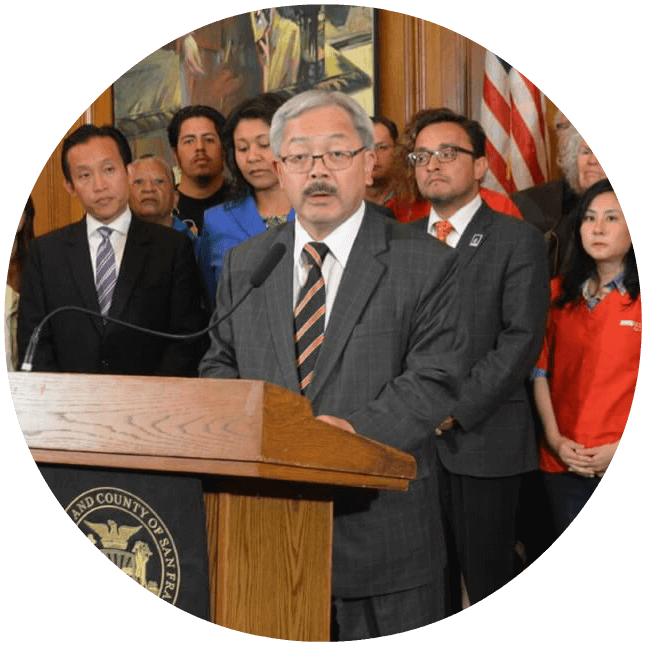
Stay In The Know
Legislative and regulatory intelligence by the Bay Area's foremost authority in landlord-tenant law
Laws can change at breakneck speed, but you can count on Bornstein Law to help you keep pace, whether they occur in city halls or under the dome of the state Capitol.
![]()
From the Capitol...
With the tailwinds of a Democratic super-majority, the Governor Jerry Brown’s pen has been busy. As Sacramento closes the curtain on a brisk year for legislation, the housing industry has many laws to digest. Here’s a summary of changes in store.
Heated battle over SB 2
Among the pantheon of 15 housing-related bills, perhaps none was more contentious than SB 2, which imposes a new fee on all real estate transactions, except sales. Opposed by all Republicans, this bill squeaked through at the last moment and will infuse funding into critical housing, especially to address homelessness, and the bulk of it will be distributed to local governments.
SB 35 Streamlines Approval Process For Housing
Another high-profile housing bill, SB 35 paves the way for streamlined housing approval when municipalities fail to meet their respective housing goals stipulated by the Regional Housing Needs Assessment. This laxed process is applicable to accessory dwelling units, also known as ‘granny flats’, as well as multi-family housing development with two or more residential units, and projects located on an urban infill site zoned for residential mixed-use development. Many Democrats expressed reservations that the bill removes local control over development. With so many cities that fall short of stated housing goals, SB 35 could be invoked on a frequent basis.
SB 3 sails to November 2018 ballot
Balked at by Republicans that argued the elimination of regulatory roadblocks is the answer to incentivize development, this $4 billion affordable-housing bond was inked by the Governor and is now headed to the November 2018 ballot.
AB 352 recognizes a tiny solution to a big problem
This bill prohibits cities from restricting “micro-units”. It effectively removes the International Building Code’s minimum requirements of 220 square feet, and bans certain limits on inventory of these efficient pint-sized units. Prior to passage, some municipalities instituted rules relating to where these apartments could be built. We hasten to say, however, that developers will still have to go through the normal building approval process.
AB 73 and SB 540 offer a carrot to development
By designating a particular community for more housing, cities receive funding and still more dollars when the projects begin coming to fruition in the form of issued permits. The Legislature placed an emphasis on low-or middle-income residents – 20% of new housing construction shall be reserved for this group. An accelerated permit approval process takes place if the zoning standards are up to par. Yet another pot of funds will fuel local government’s planning an environmental review programs.
Get a synopsis of new state laws that take affect in 2018
We've put together a handy PDF that summarizes the 15 sweeping housing bills that will influence the rental housing industry in 2018. As always, we are available to engage any questions relating to the new laws.
![]()
Download your copy »
Other news and focal points
![]()

New Legislation Affords Greater Protections To Immigrant Tenants
AB 291, or the Immigrant Tenant Protection Act, bars landlords from harassing or discriminating against tenants based on their immigration status or perceived immigration status. more...

State Wide Ban The Box Law Restricts Employer Use Of Criminal History
The employees of rental housing providers are often in close quarters of tenant possessions and children, but AB 1008 places limitations on screening job applicants for past criminal history. more...

San Francisco issues new rules related to Owner Move-In Evictions
The SF Rent Ordinance was amended to afford tenants greater protections when the owner wants to transition them out of the rental unit for the landlord’s own personal use. more...
Bill Requires Landlords To Issue Additional Disclosures In Flood Zones
Assembly Bill 646 was signed by Governor Brown on October 5 and mandates rental housing providers to disclose specified information pertaining to the risk of flooding.
READ MORE »

Costa-Hawkins Contends With Repeal Efforts in 2018
Enacted in 1995, the Costa-Hawkins Rental Housing Act puts municipal rent ordinances in check, prohibiting municipalities from establishing onerous rent control measures over certain kinds of units and bans vacancy control. Yet efforts are underway to repeal it.
GET MORE CONTEXT →
Get ahead of the curve.
There are many laws and proposals that will surely affect the acquisition, development and management of residential real estate in the Bay Area, and we are dedicated to keeping you compliant with any changes as they arise. Contact our law offices to stay informed.

